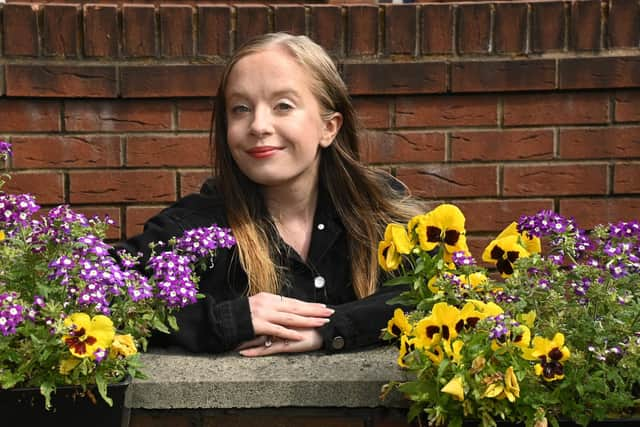Talented Wigan singer's dreams put on hold as she waits for a kidney transplant
and live on Freeview channel 276
She is 25 years old and should have the world at her feet.
But instead she has had to put her dreams on hold, as she battles serious health problems which means she has dialysis three times each week and is waiting for a kidney transplant.
Melissa, who lives in Ashton, said: “It feels like there is no means to an end. Usually with things you know when something will end, but I just don’t know how long I am going to be waiting.”
Advertisement
Hide AdAdvertisement
Hide Ad

Melissa was only 22 years old when she discovered her kidneys were failing.
She had back pain, felt breathless after exercise and suffered blurred vision, which she was told was conjunctivitis.
But her symptoms got worse, leading to vomiting, migraines, neck pain, swollen glands, weight loss and high blood pressure.


Doctors gave Melissa the devastating news that she had kidney failure and would need a transplant, as they could not be saved.
Advertisement
Hide AdAdvertisement
Hide AdThe diagnosis took a toll on her mental health, as she became depressed, had nightmares, suffered insomnia and even felt suicidal.
Melissa’s kidney function dropped to just five per cent and she had an operation to insert a tube into her stomach so she could have dialysis.
But she describes the procedure as “excruciating” and said the dialysis was an “absolute disaster”, as it took eight hours every night from a beeping machine and she developed several infections.
Eventually Melissa switched to a different type of dialysis, which takes three hours three times a week, and she saw a big improvement.
Advertisement
Hide AdAdvertisement
Hide AdAnd a few months later she received the “magical transplant call” to tell her a kidney was available for her.
Melissa went into surgery hoping it was the cure she needed.
But unfortunately instead of having a new lease of life, she had to wait for the kidney to start working and was eventually told it had failed.
Melissa had more health problems, including pain and hallucinations, and an inflamed pancreas led to a heart attack, leaving her fighting for her life in a hospital’s critical care unit.
Advertisement
Hide AdAdvertisement
Hide AdThe damaged kidney was removed and doctors found out it was infected, which could have killed her.
She has since had her gall bladder removed and Melissa’s health has stabilised somewhat, but she continues to have dialysis three times a week in place of kidney function.
She has already been waiting 18 months for another kidney transplant, which she hopes will make a real difference this time.
Melissa has tried to get on with her life, including achieving a 2:1 in a music performance degree while undergoing treatment.
Advertisement
Hide AdAdvertisement
Hide AdBut the continued impact of her health problems has meant she has had to change her plans and put some of her dreams on hold.
She said: “Since graduation I have had some time off for a bit and I have just recently started some voluntary work.
"I am going go to do a master’s degree eventually in music therapy, so I need some experience in youth zones for example.
"I am volunteering at Wigan Youth Zone two days a week, teaching music and stuff.”
Advertisement
Hide AdAdvertisement
Hide AdMelissa is a keen singer, who loves performing pop, soul and R’n’B songs in bands and solo, but she has had to step away from the stage for now.
She said: “I had my first singing lesson when I was 14 and have been doing it since then. I did music performance at college and university.
"I still sing, but I haven’t performed for a while because it’s quite a physical thing. I am starting to get back into it though now I’m volunteering.”
Melissa is doing what she can for now, as she aims to get on with her life, but she is always still waiting for another transplant.
Advertisement
Hide AdAdvertisement
Hide Ad"I have scans every now and again for the transplant log and have to give bloods every month,” she said.
"I have to keep my phone on and just wait.”
Melissa did not know anything about kidney problems before becoming ill, but she is now urging other people to be aware of kidney disease, especially young people.
She said: “Even if you haven’t got kidney disease in the family, things can just happen.
"It happens to young people as well. A lot of the time, you don’t really get checked at the doctor’s because you assume you’re young and healthy, so things get missed.
Advertisement
Hide AdAdvertisement
Hide Ad"If things had been noticed sooner for me, it would probably have erased permanent danger.
"Dialysis keeps you alive for a long time, but it doesn’t keep you alive forever and it puts a lot of stress on your body. I do need a transplant eventually.”
The NHS Organ Donor Register is now opt-out, so people are considered willing to become a donor when they die, unless they have opted out or are in an excluded group.
Organs used for donations including heart, lungs, liver, kidneys, pancreas and small bowel, while corneas, tissues and even bones can also be given.
Advertisement
Hide AdAdvertisement
Hide AdKidney donation is usually something that happens after death, but because it is possible to live a normal, healthy life with only one kidney, people can become a living donor.
To find out more about organ donation, including becoming a live donor, go to www.organdonation.nhs.uk or call 0300 123 23 23.